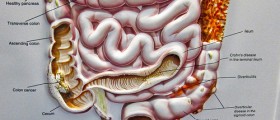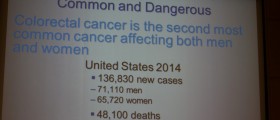
Ulcerative colitis is a chronic disease which affects large intestine. It features with inflammation and ulcers, bursts of diarrhea (usually with blood in stool), abdominal pain, cramps and high temperature. The repeated damage to the bowel may eventually lead to colon cancer. Most doctors consider this disease autoimmune. However, the exact cause has not been established yet. The diagnosis is set after the biopsy of the changes is taken during the procedures called sigmoidoscopy and colonoscopy. These procedures not only help in taking samples but they are great at discovering any additional conditions in the intestines (e.g. colon cancer). The treatment of this disease is conducted in order to reduce symptoms and inflammation and to compensate for the loss of nutrients, minerals and vitamins which is quite common for the condition.
Hemorrhage is most common complication. A patient loses small amounts of blood during time. This leads to iron deficiency anemia. Iron deficiency anemia also occurs in these patients as a result of improper iron absorption. The first attack of the illness may be accompanied with severe hemorrhage, perforations and following infection.
Toxic colitis is a state of complete destruction of the whole thickness of the intestinal wall. This condition leads to ileums, temporary arrest of the intestinal movements. Since the bowel does not push the stool gases are held within the intestine and intestinal dilatation occurs. Plain abdominal X ray may be performed to discover this serious state.
Toxic mega colon is another complication which may be life-threatening. It characterizes with enormous expansion of the intestines. Signs and symptoms include high temperature, pain in abdomen, and leukocytosis. If the intestine perforates the lethal outcome is highly likely to happen.
Colon cancer may occur as a result of ulcerative colitis but only in later stages of the disease. It starts growing from the changed wall of the intestine. Patients whose entire large intestine is affected by the illness have greater chance for colon cancer. In these patients regular colonoscopy is recommendable since it may diagnose the cancer in an early stage.
In phases of recurrence of the disease apart from diarrhea patient may experience pain in joints, inflammation of scleras, inflamed nodules in the skin or skin sores filled with pus. Additional conditions such as pyoderma gangrenous, inflammation of the spine and pelvic joints, increased blood coagulation may occur well as. These patients rarely suffer from liver dysfunctions.
Ulcerative colitis may affect the terminal part of the large intestine, the rectum, and this condition is known as ulcerative prostates. This form of ulcerative colitis is rather frequent and not as severe as ulcerative colitis of other parts of large intestine.

















Your thoughts on this
Loading...